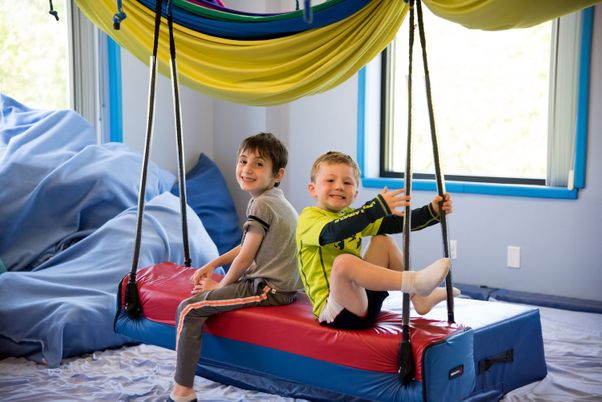06/01/2024
A Guide to Understanding Sensory Integration Therapy
South Shore Therapies provides sensory integration therapy utilizing the principles of development, neuroscience paired with meaningful therapeutic activities to help children in Southern Massachusetts achieve independence and fulfillment.

WHAT IS SENSORY INTEGRATION?
Every day, we receive a great deal of information from our senses that we use to organize our behavior, learn, and successfully interact with the world. Our senses give us input about the physical status of our body and the environment around us. Sensory experiences include touch, taste, smell, sight, sound, body awareness, movement, and the pull of gravity.
Our brains must organize this information so that we can function in everyday situations such as the classroom, at work, on the playground, at home, and during social interactions. Sensory integration is the ongoing process within the nervous system of taking in and responding to sensory events. It is truly amazing that one brain can organize input from all senses simultaneously and still come up with responses to the demands of the environment.
The central nervous system is constantly focusing, screening, sorting, and responding to sensory information both from the external environment and from internal receptors in order to perform purposeful activities. Imagine the amount of sensory integration needed to sit in a chair, pay attention in an active classroom, copy an assignment, or stand and read out loud to the class. Some children have difficulty processing all of the information they are receiving, and their behavior may be different from other children in response. Our occupational therapists are well equipped to handle the complex needs of children with sensory processing disorders.
What Is Sensory Processing Disorder?
Sensory processing disorder (SPD) occurs when the nervous system cannot effectively take in, process, and respond to the sensory information from within the body and the surrounding environment. Children with SPD may perceive sensory information in a way that is different from others. The result can be unusual ways of responding or behaving and may impact their ability to learning new skills (also known as skill acquisition). As a result, these children may face challenges when participating in everyday activities. For some children with extreme sensitivity or sensory defensiveness, avoidance of interactions and activities, agitation, distress, or anxiety may occur.
Sensory Integrative Difficulties
Everyone’s sensory systems are unique and we all have different sensory preferences, needs, and sensitivities. Everyone will experience and interact with their environment differently based on how they are processing the sensory information. For children who have more difficulty processing sensory information, their challenges can manifest in diverse ways, but ultimately will impact successful participation at home, school and in the community.
Common Sensory Problems
Overly sensitive to touch, movements, sights, or sounds: Can be distractible; withdraws when touched; avoids textures, certain clothes, or foods; exhibits fearful reactions to ordinary movement activities such as playground play. May also be sensitive to loud noises and may act out aggressively with unexpected sensory input.
- Under-reactive to sensory stimulation: Seeks out intense sensory experiences such as body whirling, falling, and crashing into objects. May appear oblivious to pain or body position. May fluctuate between under- and over-responsiveness.
- Unusually high/low activity level: Constantly on the move, or may be slow to get going and fatigue easily.
- Coordination problems: May have poor balance, can have great difficulty learning a new task that requires motor coordination, appears awkward, stiff, or clumsy.
- Delays in academic achievement or activities of daily living: May have problems in academic areas, despite average or above-average intelligence. Problems with handwriting, scissor use, tying shoes, buttoning, and zipping clothes.
- Decreased organization of behavior: Can be impulsive, distractible, lack planning in approach to tasks, and not anticipate the result of actions. May have difficulty adjusting to a new situation or following directions. Often gets frustrated, aggressive, or withdrawn when encountering failure.
- Decreased self-concept: May appear lazy, bored, or unmotivated. Avoids challenging tasks and may appear stubborn or anxious.
Sensory Integration Intervention
Research has shown that children learn through experience and play. Occupational therapists with training in sensory integration provide therapeutic activities to facilitate child-led, play-based therapy sessions to support skill acquisition. Therapist use their clinical skills to design an environment to enable the child to interact more effectively and successfully.
Following an assessment of the child's sensory systems, the therapist encourages and assists the child in choosing activities that provide organizing sensory inputs. Throughout the activity, the therapist adapts the skill level in appropriate developmental increments to facilitate integration. The motivation of the child plays a crucial role in the selection of the activities.
The therapist also creates a careful balance between structure and freedom in a way that leads to constructive exploration. Free play does not, in itself, further sensory integration. Too much structure, however, does not create challenging opportunities that allow for growth.
With this balance of structure and freedom, the therapist helps the child to develop both their neural organization and inner direction. The child is given as much control over therapy as they can handle, with the therapist aiding and assisting to keep the activity at an appropriate challenge level. Improved self-confidence is often the first change parents notice in their children after they have started therapy. The child becomes more in command of their life and world because they develop better control of their body as their nervous system functions more efficiently.
If you feel your child may be experiencing difficulties effectively processing sensations, contact South Shore Therapies. You will speak with one of our skilled occupational therapists who can help guide you to a better understanding of your child's situation and determine the most appropriate course of action. Reach out to our team to schedule a consultation today.